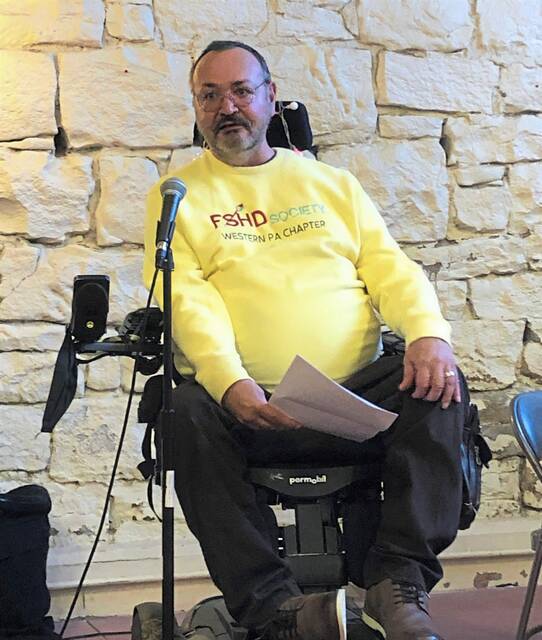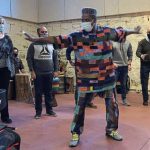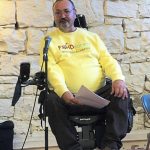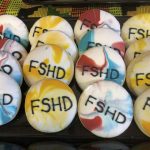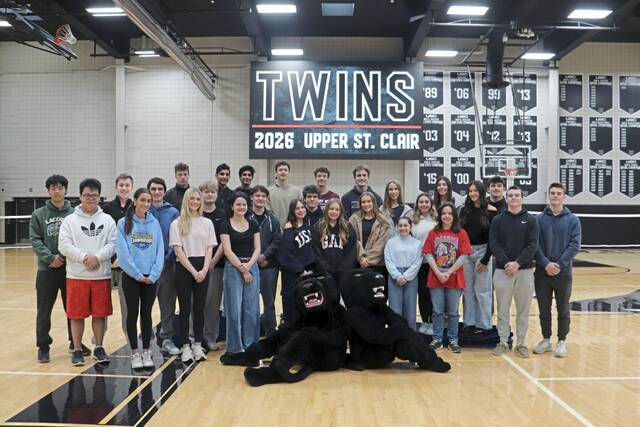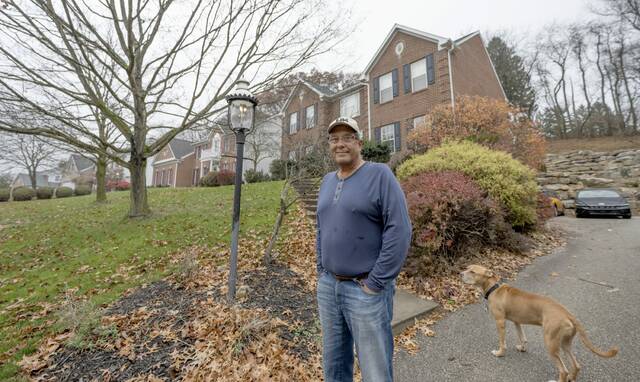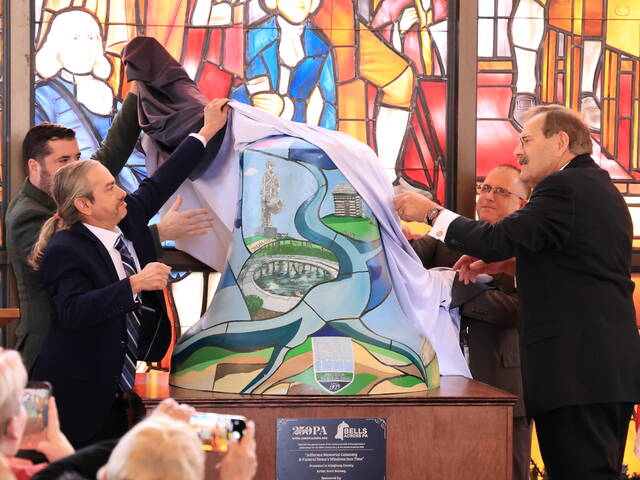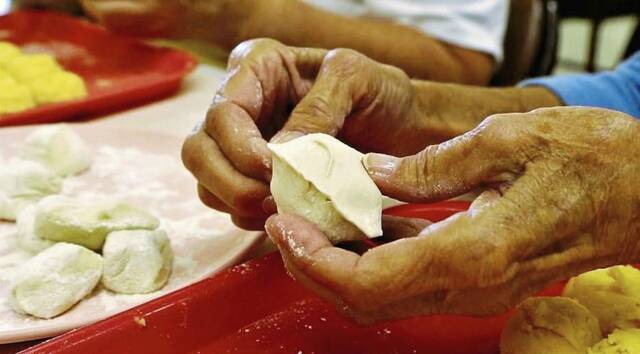Members of the FSHD Society Western Pennsylvania chapter are getting ready to rock ‘n roll for the second annual Drum & Roll to Cure FSHD event.
Set for 4 to 6 p.m. Nov. 5 at the Andrew Carnegie Free Library and Music Hall in Carnegie, the event will feature African music and dance performance, followed by an interactive dance session choreographed especially for people who use wheelchairs.
Yamoussa Camara, the director of the African Music & Dance Ensemble at the University of Pittsburgh, will lead the celebration open to patients, their supporters and the public.
The FSHD Society is a nationwide organization that provides support for people with facioscapulohumeral muscular dystrophy, a genetic disorder that causes muscle weakness and leaves about 20% of those affected using wheelchairs by age 50.
The society also raises funds and advocates for research into potential treatments and cures.
“While there is no treatment for FSHD right now, there is going to be very soon,” said Anna Gilmore, a Maryland-based regional director for the organization. “The research has gained such momentum in recent years and there’s such a lot going on. We have one treatment currently in clinical trial and two more that have been announced and will be starting either at the end of this year or next year.”
The FSHD Society, founded in 1991 by two patients, is the world’s largest grassroots network of people with FSH muscular dystrophy, their families and research activists. It has dozens of volunteer-led chapters in the United States and Canada, along with affiliates worldwide.
“For a large part of our history, the society primarily funded academic research, and we still do that,” Gilmore said. “But now we also do a lot of other things, including initiating our own projects that help speed clinical trial progress and build a community of people who have FSHD for what we call an army of activists.
“We know that one of the best ways to get a drug from research into actual therapeutic development is collective intent, so we talk a lot about getting the community together to make sure their voice is heard by regulators and drug companies,” she said.
“We are a really small organization, however, we have incredible volunteer leaders all around the country who put together education resources, community events, support gatherings and fundraisers in their local areas.”
In Western Pennsylvania, that volunteer leader is Mark Christman of Whitehall, who founded the local chapter.
A retired attorney, Christman was diagnosed with the disease in 1977 at age 16. The first time he met another person with FSHD was in 2014 when he attended an FSHD Connect conference in Boston.
“That’s a long time,” Christman said. “It energized me to think about the future, to find a cure, to help other people who have gone through the same things as you.”
Achievable goal
FSHD results from a genetic defect that causes the overproduction of a protein that kills muscle cells. It affects approximately one in 8,333 people across the globe – more than 870,000 worldwide.
Its severity can vary widely, from no outward symptoms to leg and arm immobility, hearing loss and blindness. It typically affects the face, shoulders and upper arms and, as it progresses, can affect the lower extremities.
“The society believes it’s an achievable goal to find a treatment for this disease, or a therapy, by 2025,” Christman said. “That doesn’t mean a cure, but there are drugs currently in the pipeline that would stop the disease progression.”
That’s why fundraisers such as Drum & Roll, which garnered $32,000 in its inaugural year, are so important, Christman said.
“One of the biggest hurdles is showing that a treatment works,” Christman said. “If you have a progressive disease, and sometimes it doesn’t progress at all for long periods of time, how do you measure the disease or whether a treatment is working?”
A drug’s effectiveness must be proven to get approval for use from the U.S. Food and Drug Administration, he said.
“The society is working hard with pharmaceutical companies to find ways of demonstrating the effects of the treatments,” he said.
Supplementing the work of the national organization, the local chapters are important for creating a support network for FSHD patients and their families.
“It’s really nice to be able to talk to others with the affliction, if you will, and how they’re coping with the disease and to provide some mutual support,” said Roy Stang, a retired engineer from Sarver who was diagnosed with FSHD about two years ago at 62.
With symptoms including weakness in his arms and the inability to lift them above his head, Stang was initially diagnosed with spinal stenosis. Following spinal fusion surgery and visits with several neurologists, he learned he actually had FSHD.
“Looking back, I had some signs of the disorder,” Stang said. “I suspect my mother might have had it. I see some traits that I have that she had, so I think that was the culprit. Like me, there are probably a lot of people out there wondering about their symptoms. In retrospect, my symptoms were FSHD-related. Thankfully, I lived a pretty normal existence into late adulthood before I knew what was going on.”
For Stang and his wife, Deanna, the society has been “a tremendous resource” of information, support and community.
“It’s very helpful for spouses. Deanna has had to compensate for things I can’t do anymore,” he said.
One-of-a-kind event
In addition to his work with the FSHD Society chapter, Christman has served on the Whitehall zoning board and is a Trib Total Media board member.
He also has taken courses through Carnegie Mellon University’s Osher Lifelong Learning Institute. That’s where he came across Camara, and the idea for Drum & Roll was born.
Camara immigrated to the United States in 1995 from his native Guinea, West Africa. By then, he already had been the youngest lead drummer in Les Ballets Africains, the national dance company of Guinea. He taught at Yale University for more than 10 years and toured the country teaching, performing, and choreographing for numerous music and dance ensembles. In addition to teaching at Pitt and CMU, Camara also teaches at Point Park University.
“(Drum & Roll) is one-of-a-kind and totally the brainchild of Mark,” Gilmore said. “He convinced (Camara) to come and do this performance for us and lead a little bit of instruction in dance that is adaptable for people who use mobility devices.
“It’s an inclusive event, totally unlike anything you’ll find anywhere else. It’s just very special and really is a lot of fun,” she said.
In addition to the dancing and drumming, there will be a cookie table and prize drawings. The chapter will be giving away three sets of four tickets each for the Dec. 3 Pittsburgh Penguins game against the St. Louis Blues, with seats in the Trib Total Media suite at PPG Paints Arena.
“All you have to do to be entered into the drawing is show up at our event,” Christman said.
People who donate or raise at least $100 for the society will have a chance to win an authentic African djembe drum.
While the FSHD Society Western Pennsylvania chapter covers the state from State College westward, its membership is small, Christman said.
There are three or four core members who attend all meetings, which usually take place quarterly and variously include education, sharing and support or fun activities.
“We have about eight to 10 other people who every once in a while will attend a meeting,” Christman said. “Because this is a rare disease, there just aren’t enough of us to have a big chapter.
For more information on Drum & Roll, visit fshdsociety.org.



